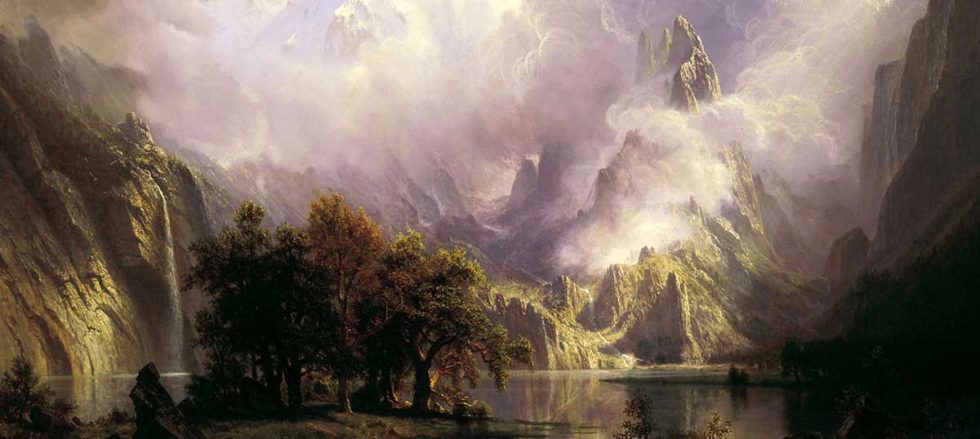Albert Bierstadt was a prominent American artist of the 19th century, best known for his magnificent paintings of the American West. His works showcase the natural beauty of the wilderness, with his exceptional talent for capturing the awe-inspiring landscapes and scenery of the region.
Through his use of vivid colors, intricate details, and breathtaking compositions, Bierstadt’s paintings give viewers a sense of the vastness and majesty of the American landscape. Bierstadt’s paintings were remarkably sought after during his lifetime, and they continue to be admired and studied by art enthusiasts and scholars today.
His work had a profound influence on the development of American art and helped to define the Romanticism movement in the United States. In this blog post, we will look at some of Bierstadt’s most famous paintings and examine what they reveal about his artistic vision and the beauty of the American West.
The Majesty of Nature
The majesty of nature is a recurring theme in Albert Bierstadt’s paintings, and it is one of the defining features of his work. Bierstadt’s paintings often depict vast, sweeping landscapes that convey a sense of awe at the natural world. He was particularly drawn to the Rocky Mountains, and many of his most famous works depict the rugged beauty of this region.
One of the ways that Bierstadt captures the majesty of nature is through the scale of his paintings. His canvases are often quite large, and they allow him to create expansive landscapes that convey a sense of grandeur and magnificence. He also makes use of dramatic perspective, placing the viewer at a distance from the landscape and allowing them to take in the full scope of the scene.
The majesty of nature has always been a central theme in Albert Bierstadt’s paintings. Through the use of scale, detail, light, and color, Biesrstadt was able to brilliantly capture the awe-inspiring beauty of the American West and invites viewers to experience the wonder of the natural world.
Dramatic Use of Light
Another important aspect of Bierstadt’s painting that is clearly visible in his artworks is the dramatic use of light. He was known for capturing the beauty of natural light, particularly during the golden hours of sunrise and sunset. Bierstadt’s paintings often depict the changing light of these times of day and the way that it transforms the landscape.
Bierstadt uses light to dramatic effect by creating contrast between light and shadow. His paintings often feature dark, shadowed areas contrasted with areas of bright, direct light. This creates a sense of depth and three-dimensionality in his paintings and allows him to highlight specific elements of the landscape.
An expert in creating a balanced contrast between light and dark, Bierstadt would often paint dark, shadowy areas in the foreground of his landscapes and then use light to illuminate the background. This technique created a sense of depth and perspective and added to his paintings’ overall sense of majesty and grandeur.
American Identity
Albert Bierstadt’s painting also showed that he took pride in being an American and helped shape its identity in the 19th century. Through his depictions of the American West, Bierstadt contributed to American identity.
At a time when the nation was expanding westward and struggling to define its identity, Bierstadt’s paintings helped to create a sense of national pride and a connection to the land. His paintings of the Rocky Mountains, Yosemite Valley, and other iconic landscapes helped to establish a sense of American exceptionalism, portraying the United States as a land of great beauty and opportunity.
In doing so, Bierstadt helped to foster a sense of pride and patriotism among Americans. His paintings were widely exhibited and admired, and they helped to create a shared sense of national identity based on a love of nature and the American landscape.
Famous Paintings by Albert Bierstadt
Now, let us have a look at some of the most famous paintings by German-American artists. The Rocky Mountains, Lander’s Peak (1863): The painting is a stunning representation of the American West, capturing the beauty and power of nature in a way that has inspired generations of artists and viewers. Known for its use of dramatic light and color, the warm hues of the sunset suffuse the landscape and cast deep shadows across the mountains and valleys.
Valley of the Yosemite (1864): A breathtaking depiction of the iconic valley in California’s Sierra Nevada mountains, the painting captures the majesty and grandeur of Yosemite. The painting features a central waterfall cascading down a rocky cliff face, with mist rising from the base of the falls. In the foreground, a crystal-clear stream winds its way through the valley, surrounded by lush green trees and foliage.
The Last of the Buffalo” (1888): This painting depicts a lone buffalo standing on a snowy plain, with a group of Native Americans in the background. Known for its emotional impact, the painting conveys a sense of loss and nostalgia for a vanishing way of life. The buffalo were hunted to near-extinction in the 19th century, and Bierstadt’s painting is a poignant reminder of their once-great numbers and cultural significance.
The Bottom Line
To sum up, Albert Bierstadt’s paintings are masterpieces of American art, capturing the majesty and grandeur of the American West and its natural landscapes. Through his use of dramatic light and color, intricate detail, and powerful imagery, Bierstadt created works of art that continue to inspire and captivate viewers to this day.
His paintings are not merely representations of nature but also convey a sense of the American identity and the connection between humans and the land they inhabit. They also serve as a poignant reminder of the consequences of human activity on the environment, highlighting the importance of preserving our natural landscapes and the need to protect our planet for future generations



















Add Comment